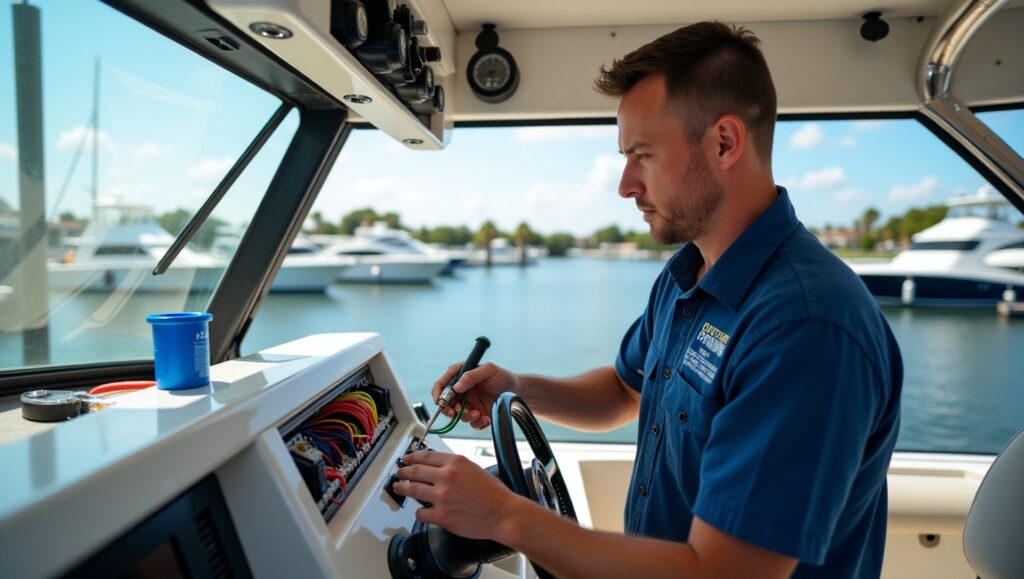Your boat’s electrical system powers everything from navigation lights to your VHF marine radio. Yet many boat owners overlook this critical component until problems arise. Understanding when to rewire your vessel can prevent dangerous situations and costly repairs while ensuring reliable performance on the water.
Boat electrical systems face unique challenges. Salt air, moisture, and constant vibration create conditions that accelerate wear and corrosion. What seems like minor electrical issues often signal deeper problems that require professional attention.
Understanding when to rewire protects your investment and ensures reliable operation for years to come.
Why Boat Rewiring Is Essential for Marine Safety
Electrical systems serve as the lifeline of modern boats, powering navigation equipment, communication devices, and safety gear. When these systems fail, you’re not just dealing with inconvenience—you’re facing potential safety hazards in open water.
Aging wires create multiple risks. Corroded connections can cause fires, especially in marine environments where salt accelerates deterioration. Failing circuits leave critical systems like bilge pumps and navigation lights inoperative when you need them most. Poor connections also reduce efficiency, causing batteries to drain faster and equipment to perform poorly.
The U.S. Coast Guard emphasizes proper electrical maintenance as a key factor in marine safety. They recommend regular inspections and professional upgrades to prevent electrical fires and system failures. Having proper safety equipment, like a 5 B fire extinguisher, becomes even more important when dealing with outdated electrical systems that pose higher fire risks.
Key Signs It’s Time to Rewire Your Boat
Dimming or Flickering Lights
When your boat’s lights dim or flicker, especially LED fixtures like the Lumitec SeaBlaze Mini Spectrum underwater lights, it indicates voltage drops or poor connections. This problem often starts small but worsens over time, eventually affecting other electrical components.
Frequent Breaker Trips or Blown Fuses
Circuit protection devices should only trip when there’s actual overload or short circuits. If breakers trip regularly during normal operation, your wiring may be degraded or undersized for current electrical demands.
Corrosion or Brittle Wiring
Marine environments are harsh on electrical components. Salt air, moisture, and temperature changes cause wire insulation to crack and connections to corrode. Visual inspection often reveals green corrosion, cracked insulation, or wires that feel stiff and brittle.
System Upgrades Require New Wiring
Adding modern electronics, such as boat VHF radios, GPS chartplotters, or sonar units, often requires upgraded wiring. These devices need a proper power supply and may require specific cable types for optimal performance. Accessories like Bushnell 8×25 binoculars for navigation and Roswell boat mirrors for visibility don’t require rewiring, but electronic upgrades typically do.
Adding or Replacing 12v Boat Battery Systems
Upgrading to larger battery banks or switching to lithium batteries requires proper wiring to handle different charging profiles and current demands. Old wiring may not support the amperage needed for modern battery systems.
Benefits of Professional Boat Electronics Installation
Rewiring your boat delivers multiple advantages beyond basic functionality. Enhanced safety tops the list—new wiring eliminates fire risks and ensures reliable operation of critical systems. Your navigation equipment, communication devices, and safety gear work as designed when properly powered.
Performance improvements follow closely. Modern wiring supports top VHF marine radios, advanced GPS systems, and fish finders without voltage drops or interference. Better electrical systems also support boat storage solutions, such as electric compartment latches and custom fillet table accessories, which require reliable power.
Professional rewiring creates cleaner, more organized installations. Choose NMEA-certified Installers for proper cable management to prevent damage and to make future maintenance easier. Quality installations also boost resale value, as buyers recognize the importance of reliable electrical systems.
New wiring supports advanced equipment upgrades. Whether you’re adding a Stingray Junior hydrofoil, installing a black carbon monoxide detector, or upgrading to Ultra Fab landing gear, proper electrical infrastructure ensures these systems operate reliably.
Choosing Professional Marine Electricians
Professional installation matters significantly for marine electrical work. Marine environments create unique challenges that require specialized knowledge and experience. Certified marine electricians understand proper wire types, connector specifications, and installation techniques for saltwater environments.
Ask potential contractors about their marine-specific certifications and experience. Verify they provide warranties on both parts and labor. Request references from recent customers and examples of similar installations.
Looking for expert boat rewiring near me? Florida-based marine electricians at Custom Rigged Marine offer years of specialized experience in boat electronics installation and complete electrical system upgrades.
What to Upgrade During Your Rewire
Rewiring projects offer excellent opportunities to upgrade multiple systems simultaneously. Consider adding an Americana refrigerator RV unit for extended trips, which requires a proper electrical supply and may benefit from dedicated circuits.
Performance accessories like the CMC breakaway plate don’t require electrical connections, but organizing your best boat tackle box setups might include adding electrical accessories like LED lighting or charging stations.
Bundling electrical upgrades during rewiring projects often reduces overall costs and minimizes disruption to your boating schedule.
Protect Your Investment with Custom Rigged Marine
Your boat’s electrical system is too important to leave to chance. From powering your 12V boat battery system to ensuring your VHF marine radios, navigation lights, and safety equipment work without fail, proper wiring is the foundation of onboard reliability. When signs of wear, corrosion, or poor performance appear, it’s time to take action—before small issues turn into expensive and dangerous failures.
At Custom Rigged Marine, we specialize in professional boat rewiring, marine electronics upgrades, and custom installations for vessels of all types. Whether you’re dealing with frequent breaker trips, installing new gear upgrading to modern systems, our experienced technicians deliver expert solutions tailored to your vessel’s needs.
Contact Custom Rigged Marine today for expert boat electronics installation and professional rewiring services in Florida.
FAQ’s
- How often should you rewire your boat?
Ans: Most boats need rewiring every 15-20 years, depending on usage and maintenance. Boats in harsh saltwater environments may need attention sooner.
- Is rewiring necessary for occasional use?
Ans: Even occasionally used boats benefit from reliable electrical systems. Safety equipment and bilge pumps must function when needed, regardless of usage frequency.
- Can I rewire my boat myself?
Ans: While some basic electrical work is possible, marine wiring requires specialized knowledge for safety and reliability. Professional installation ensures proper techniques and materials.

